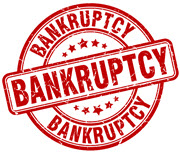What Happens In An Indiana Bankruptcy?

Most distressed debtors can choose between Chapter 7 and Chapter 13 bankruptcy. They both begin the same way, by filing a petition and schedules. In emergency situations when time is short, it’s often possible to just file a petition and a few supporting documents. Once the creditors receive notice of the filing, the automatic stay takes effect, in most cases.
The property exemptions are very much the same as well. Both Illinois and Indiana have very generous exemptions. A bankruptcy in either state does not affect:
- – Most home equity,
- – Retirement accounts of any value,
- – Personal property, and
- – A “wildcard” exemption of otherwise nonexempt property, like a boat.
As outlined below, the trustee (person who oversees the bankruptcy for the judge) sometimes asks for additional information. But for the most part, the trustee does not ask many questions in this area.
Chapter 7 Procedure in Illinois
Usually, the next step is the oddly-named creditors’ meeting. Although the moneylenders receive notice of the date, time, and location, very few send representatives. Usually, it’s only the debtor, the debtor’s attorney, and the trustee.
The trustee will most likely want to review several documents at the 341. In addition to identification documents (Social Security card and driver’s license), the trustee usually wants to see some financial documents. That list could include recent paystubs, business profit and loss statements, tax returns, and/or W-2 statements. Documents regarding property, such as insurance declarations pages and mortgage notes, are often on the list as well.
After verifying some basic information, Chapter 7 trustees usually approve the bankruptcy documents. The judge signs a discharge order about six or eight weeks later, and the case is closed. In some cases, however, the proceedings remain open.
Chapter 13 Procedure in Chicago
A Chapter 13 trustee takes a much more active role in the process. Instead of just approving documents, the trustee evaluates that debtor’s monthly finances. Based on that income and expense evaluation, the trustee basically puts the debtor on an allowance for either three of five years.
The Illinois trustee approves certain expenses, denies some others, and modifies others. Any disposable income then goes into a monthly debt consolidation payment. This money goes first to attorneys’ fees, if any, next to delinquent amounts on any secured debts, and finally to any unsecured debts.
“Secured debts” are obligations related to property ownership rights, such as a home mortgage or an auto loan. “Unsecured debts” are those obligations secured by a verbal or written promise to pay, such as credit cards and medical bills.
Some Possible Bumps in the Road
Very few bankruptcies proceed smoothly. There are almost always a few lingering issues. But an experienced and tenacious attorney can usually resolve these questions in the debtor’s favor.
Property value is sometimes an issue in Indiana. For example, a home’s tax appraisal value is usually not its bankruptcy value. The debtor must list the as-is cash price for a house and any other listed asset. Depending on the circumstances, that value is usually between 60 and 80 percent of the current fair market value.
Adversary proceedings sometimes come up as well. These things are not always adverse to the debtor’s interests. If the debtor has student loans, the debtor’s attorney must file an adversary proceeding to obtain a discharge, even though these loans are technically unsecured debts. The same thing often applies to other special-category debts, such as delinquent income taxes.
Rely on Experienced Attorneys
A good bankruptcy attorney does much more than just file forms. For a free consultation with an experienced bankruptcy attorney in Chicago, contact the Bentz Holguin Law Firm, LLC. We routinely handle cases in both Illinois and Indiana.
Resource:
wallethub.com/edu/bankruptcy-exemptions/25869/


